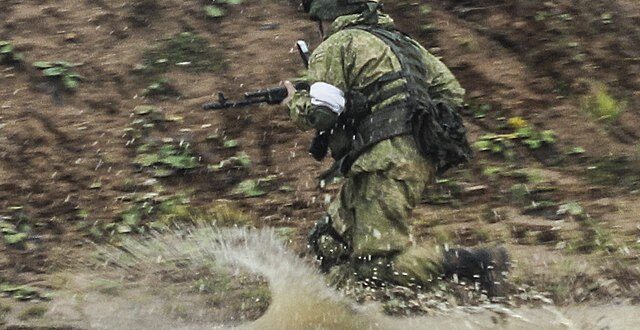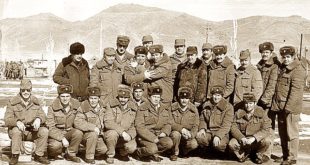by Timofei Rozhanskiy
As fighting raged in an around Bakhmut amid Russia’s unrelenting assault earlier this year turning the eastern Ukrainian city to rubble, a Russian conscript began plotting how he would desert shortly after being deployed there.
Anton (not his real name) said he was given a two-week leave in August that would prove his ticket out of the carnage.
“From the first days there, I began to intensely study this. I surfed the Internet. What? How? Where?” Anton recounted recently from an undisclosed location abroad to Current Time, the Russian-language network led by RFE/RL in cooperation with VOA.
READ MORE: Russian Soldiers in Ukraine Wear Soviet Symbols
Anton is just one of a growing number of Russian soldiers who have reportedly deserted their military units in Ukraine. While no hard figures are available, the independent news outlet Mediazone has reported that 2,076 criminal cases were opened in the first half of 2023 against Russian soldiers accused of abandoning their units without leave. That is said to be twice the total for 2022 and three times higher than the prewar figure for 2021. Analysts say the true figures are likely higher given the Kremlin’s systematic attempts to hide information about the military.
Despite the risks of prosecution, it’s a gamble more Russian conscripts appear to be willing to take. The Georgian-based antiwar organization Idite Lesom — which means “go through the forest” in Russian – helps Russian soldiers to desert. It said 18 percent of all requests they’ve received from those wanting to desert were registered in October alone.

“There is no rotation; it is very difficult to go on leave. Deserters who went on leave or ended up in the hospital say this is their only option not to end up in the war again,” Daria Berg, an activist with Idite Lesom, told Current Time.
The voices of the wives of Russian soldiers have grown louder too in recent weeks, too, challenging the Kremlin’s argument that mobilized troops are needed in combat indefinitely to secure what Moscow defines as victory in Ukraine.
In no mood to compromise, Russian authorities “are likely attempting to quash public dissent by wives of deployed soldiers, including by attempting to pay them off and discrediting them online. This follows small protests in Moscow in November,” the British Defense Ministry noted in its Intelligence Update on December 2.
It pointed out that on November 27 a prominent online group for soldiers’ wives published a manifesto against ‘indefinite mobilization” but was quickly “pinned with a ‘fake’ warning label — likely at the instigation of pro-Kremlin actors.”
“The authorities are likely particularly sensitive to any protests related to those citizens mobilized in September 2022, who have now been at the front line for over a year,” the British Defense Ministry said.
The protests by wives come amid a reported uptick in Russian military casualties as its forces attempt to seize the small eastern Donbas city of Avdiyivka amid strong Ukrainian resistance.
Due to that Russian offensive, the British Defense Ministry said on November 27 that “the last six weeks have likely seen some of the highest casualty rates of the war so far.”
Neither Moscow nor Kyiv gives timely data on military losses, and each is at pains to amplify the other side’s casualties. Russia has publicly acknowledged the deaths of just over 6,000 soldiers. The real figure is likely much higher.
The first independent statistical analysis released in July found that nearly 50,000 Russian men had died in the war in Ukraine.
For those soldiers deployed on the battlefield and yearning to desert, the chances are slim to none, according to Berg.
“This is very difficult to do, because if you are already in the war zone in the occupied territories, there are detachments that, if they don’t kill you, they’ll put you in pits. These are like prisons, where [the would-be deserter] is tied naked to trees. The conditions are unbearable,” Berg explained.

Earlier this year, Anton, who hails from the Ivanovo region of Russia, was first deployed after three months training in Russia to Dibrova, a town in the eastern Ukrainian region of Luhansk, much of it under control by Russian-backed forces since 2014.
“We replaced the local defense forces of the Luhansk region there. We stayed there for six months until the summer. We saw an intense spring there,” he said.
By the summer, Anton was sent to Bakhmut to replace Wagner mercenaries who had withdrawn in May as they handed over control of the area to Russia’s military.
Bakhmut was captured by Russian forces that month after more than 220 days of brutal house-to-house fighting.
“There were a lot of people in Bakhmut. There was nowhere to house people…. There were lots of buildings, but all were destroyed. And the basements were filled with fecal matter. It was completely unsanitary,” described Anton.
He remained in Bakhmut until August, when he received his two-week leave. He returned home and managed to slip out of the country with the help of Idite Lesom.
Anton said he was always opposed to the war, but evading conscription, he said, required money he didn’t readily have.
“The majority do not understand the goals of the war. Something somewhere does not add up. They [the Russian authorities] say one thing, but in fact [the reality] here is something else,” he said.
While gauging the public mood in authoritarian Russia is tricky at best, a recent poll showed for the first time since the start of Russia’s full-scale invasion in February 2022 that more Russians want their government to enter peace talks with Ukraine than continue the war.
The Washington-based Institute for the Study of War on December 1 reported that Chronicles, an independent Russian polling organization, said its October telephone survey indicated that the number of respondents who were “consistent” supporters of the war — those who expressed support for the war, do not support a withdrawal of Russian troops from Ukraine without Russia having achieved its war aims, and think Russia should prioritize military spending — fell from 22 percent to 12 percent between February and October this year.
However, there are no signs Russian President Vladimir Putin is willing to back down. On December 1, Putin ordered the country’s military to increase the number of troops by nearly 170,000 to a total of 1.32 million, as Moscow’s military action in Ukraine continues into its 22nd month.
It is the second such expansion of the army since 2018. The previous boost by 137,000 troops, ordered by Putin in August 2022, put the military’s numbers at about 2 million personnel and about 1.15 million troops .
“Our goal is to make sure that fewer people are fighting,” said Berg. “So that Putin has fewer soldiers and officers to kill Ukrainians.”
For Anton, he is still not sure where he will ultimately settle in Europe, but he is certain he will not return home to Russia.
Written by Tony Wesolowsky, based on reporting by Current Time’s Timofei Rozhanskiy.
Timofei Rozhanskiy is a correspondent in Riga for Current Time, the Russian-language network led by RFE/RL in cooperation with VOA. Born in Russia, he graduated from St. Petersburg State University, and received film and video training at Bard College in New York.
 Soldier of Fortune Magazine The Journal of Professional Adventurers
Soldier of Fortune Magazine The Journal of Professional Adventurers






